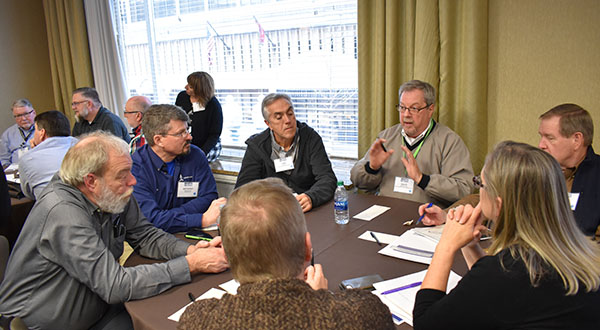Conference facilitates safety, training improvements
At the time of writing, I am off to the Propane Education & Research Council’s (PERC) 2020 National Safety & Trainer’s Conference in Memphis, Tennessee. More than 100 propane safety and training professionals were registered for this year’s event.

Propane professionals collaborate on safety issues at the 2020 National Safety & Trainer’s Conference in Memphis, Tennessee. Photo by Tyler Gunter
The conference provides an opportunity for propane professionals to gather, learn about upcoming programs, discuss training aids that others are using, review incidents and accidents for prevention opportunities, and, most importantly, communicate with one another about how to improve education for the industry.
“Right now, there is a tremendous potential for safety and educational improvement through change, and anytime there is an opportunity for propane professionals to interact and learn from one another it is very gratifying, especially when it helps marketers be safer and the propane industry be more successful,” says Eric Kuster, vice president of safety, education and compliance at PERC.
Change is something most of us don’t enjoy. We get comfortable in the way we do things, and although good habits improve safety, change is needed to improve safety and training over time.
Workforce development continues to be a challenge for our industry. The need to find industry employees, fill classrooms and develop additional training programs for commercial drivers and service technicians is important to the industry’s future.
Another common topic of discussion is the need for additional or improved safety communications and education for customers and employees. The challenge as we progress is to make training concise and to ensure the efficient use of valuable training time, all while improving the effectiveness of these programs.
Education is a critical component of workforce development. We need to keep an open mind about ways to adapt to the changing needs of the incoming workforce and leverage technologies that deliver education in different ways.
The reorganization of our educational materials into smaller, manageable courses allows learning to build in stages, starting with a solid foundation, progressing through core skills needed for tasks or functions employees are performing, and continuing this progression as job tasks and responsibilities evolve.
The industry now has a learning management system, which gives us options for delivering and maintaining this information while ensuring compliance, providing information about how programs are used and evaluating programs’ effectiveness.
A critical component of successful change is for industry members to provide thoughts, concerns and feedback to industry leaders, including state and national organizations. There is no better way to make this communication happen than through events that bring all industry stakeholders together, like the National Safety & Trainer’s Conference. I hope you were able to attend, and, if not, there are a number of upcoming industry events to make your voice heard.
Remembering Sam McTier
I want to say a few words about one of my mentors in the industry, Sam McTier.
Sam was the first person to welcome me into PERC’s Technology, Standards and Safety Committee, and pushed me to speak up for what I believe is right. He taught me there is a time and place for self-interest but to remember that, without the industry as a whole, there are no individual businesses and, without propane users, there is no industry. We must work together and insist on innovation and change for the betterment of our successors.
I will miss you, Sam, my friend.
Randy Warner is the product safety manager for Cavagna North America.
NOTE: The opinions and viewpoints expressed herein are solely the author’s and should in no way be interpreted as those of LP Gas magazine or any of its staff members.
















